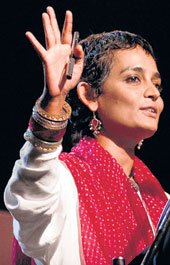 |
| DAM THE CONTEMPT: Arundhati Roy was arrested in 2001 because she had questioned the judiciary |
A small reference to the past, to begin with. In what was perhaps the most controversial chapter in the saga of protests against the Narmada dam, writer Arundhati Roy was served a notice in September 2001 for contempt of court by the Supreme Court of India. She was found guilty of accusing the court of being prejudiced for taking up a petition filed against protesters of the project ? a motley group that included Roy.
The Supreme Court was ready for the Narmada case even though it had already deferred a hearing on the Tehelka defence scandal, citing a heavy workload. Roy found it strange that the court could put off a case pertaining to national security over a case involving human rights activists who were opposing a dam. But the court thought that she, in pointing out the jury’s whimsical ways, was questioning its authority. Roy subsequently spent a night in prison and was later released on bail, and the public went out of its way to criticise the way in which the Indian judiciary made undue use of privileges granted to it by the law of the land, truth notwithstanding.
All that is perhaps about to change, as an amendment proposed two years ago finally goes on to dent the judicial armour of unaccountability. The Contempt of Courts (Amendment) Bill, which was first drawn up by the erstwhile NDA government in 2003 and later adopted by the UPA government in 2004, seeks to modify Section 13 of the Contempt of Courts Act, 1971, by allowing litigants to furnish truth as defence, when it comes to pleading innocent for contempt of court. Passed by the Lok Sabha in August, the Bill got the nod from the Cabinet recently.
When made an integral part of the Act, the amendment shall enable citizens to challenge the way a court functions or rules, provided he or she can follow up the observations with substantiated truth. And many feel it’s a rather healthy development in a legal system that had long insulated the jury from public criticism. “Truth, after all, is a Gandhian principle, and there is no reason why it should not prevail while questioning a jury’s decision,” says Delhi-based advocate Ashok Agarwal.
Worth noting, however, is the fact that the proposed law stands at loggerheads with the privilege granted by the Constitution to the high courts and the Supreme Court, to try people for contempt. “But that should not interfere with the Act, simply because the constitutional right of the judiciary is subject to the provisions of the Act itself,” observes Agarwal.
In other words, if Roy had vented her wrath today, she would, in all probability, have stood vindicated. Or would she? A flip-side to the proposed amendment is the fact that it allows truth to be produced as defence, only if it happens to be in public interest. Incidentally, the term ‘public interest’ is left open to judicial interpretation, and can thus be read differently by different courts of law on a case-to-case basis.
It is a clause that has already made lawyers see red. “As it is, public interest is a phrase that is not defined anywhere except in judicial pronouncements made by the Supreme Court,” says Supreme Court advocate Lalit Bhasin. “And those definitions being subjective, the meaning of public interest can be stretched, narrowed down or abrogated by a court of law as desired. The law thus remains as vague as it ever was.”
To sum up Bhasin’s apprehension, a court ? despite the proposed amendment ? could continue to enjoy its insular status, by interpreting in its own way an element of truth furnished by a litigant as defence. Worth noting, however, is the fact that debate on the Bill has been entertained on certain fronts. “For example, a suggestion that an indicted judge should not be part of the proceedings of contempt of court has been upheld,” says Supreme Court advocate Prashant Bhushan, who was part of a group of experts who reviewed the Bill.
Interestingly, a request from the experts to delete the term ‘public interest’ from the Bill was upheld by the standing committee, only to be shot down by the ministry of law and justice, which felt that granting truth as an absolute defence could put undue pressure on the judges and their decisions, and their verdict could be ridiculed in public. “Judiciary may, then, be unduly criticised by different quarters claiming truth as absolute defence,” the department of justice observed.
Needless to say, the ministry’s views prevailed, even though the country’s national motto suggests that truth ought to. And that’s how it remains. And truth, for that matter, will always remain subjective, at least in the eyes of the law.
Remember Akira Kurosawa’s Rashomon?










